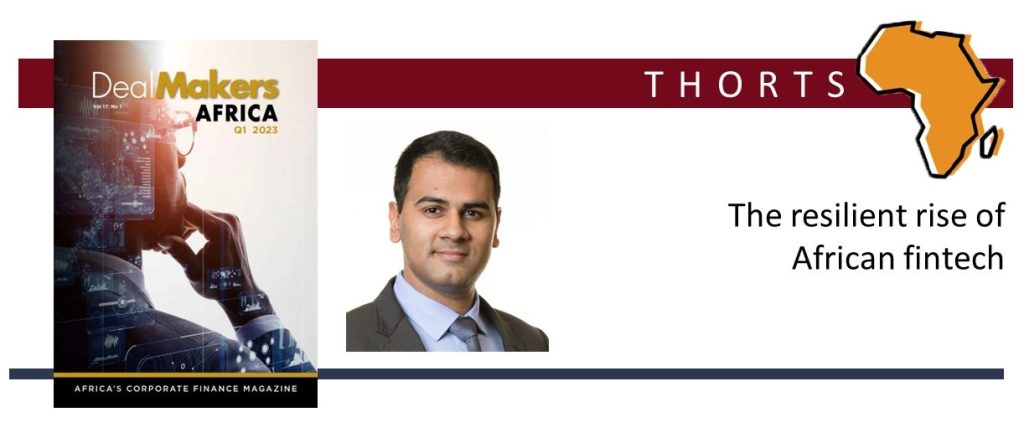Despite global economic challenges, the African fintech ecosystem continues to expand, with startup fintech investments proving a dominant source of venture capital deals. In 2022, over 100 startups in Africa obtained first-time funding above US$1 million, with fintech proving a strong source of investment. This reflects a steady course for growth in African fintech, with the industry making up more than 25% of all venture capital rounds in the last few years.
In such investment rounds, South Africa is joining other regional leaders, like Egypt, Nigeria and Kenya. Nigeria and Kenya have been two of the African fintech hotbeds garnering the most attention. Kenya’s fintech explosion occurred largely because the general African fintech wave followed the penetration of mobile phone technology and infrastructure. Kenya’s current mobile penetration surpasses the country’s entire population by 12%. Kenya’s fintech industry was originally focused on mobile money transfer services, and rode the wave of exponential market adoption between 2007 and today. Building on technology akin to GSM text messaging, major players in the market were able to expand their offering to users who did not have internet or data connections, but had access to cellular phone towers and basic mobile devices. In that same period, financial inclusion went from 26% in 2006 to 83% of the total population today. That activity created a market that many other fintech entrants were able to diversify within and, as a result, a large portion of GDP flowed through such services. This makes the regulators similarly fintech-friendly and creates interest in being cooperative towards innovation.
Nigeria’s rise has been similar, although perhaps more rapid in the last few years. Three of the largest African unicorns come from Nigeria, and the country is dominant in Africa in respect of fintech venture capital investments. This has followed some of the same drivers as Kenya on mobile penetration, but has also benefitted from a highly entrepreneurial technology sector and deep issues in respect of financial inclusion. About 38 million adults in Nigeria are completely financially excluded, particularly when it comes to credit access. This created the perfect conditions for dynamic fintechs to emerge, with a massive potential market if successful.
Out of the nine notable tech unicorns in Africa, seven are fintech companies. In terms of scaled fintech, mobile money, and third-party payment systems in particular, are segment leaders in the African fintech space, with more than half of the world’s mobile money customers now based in Africa. Many experts predict Mobile Network Operators (MNOs) will refine their fintech strategies in 2023 and 2024, taking more space out of the traditional banking industry, particularly as they begin to obtain mobile money licenses in new territories.
Nonetheless, the traditional banking industry has also seen some notable projects. In South Africa, for instance, the recent launch of the rapid payments system branded as ‘PayShap’ has been a particularly noteworthy development.
PayShap is the outcome of an industry-spanning collaboration, driven by BankservAfrica, the Payments Association of South Africa and the South African banking community, with the aim of modernising the national payments industry in the country. This development signals a progressive approach by local policymakers, together with the industry, and will hopefully lead to more dynamism in the sector and wider access to the country’s fintech products and investment opportunities, whilst keeping in step with the growing demands of international standards. It is also, however, a potential disruptor in the fintech sector, where some successful fintech ventures have built their payment products in the gaps of the traditional banking digital payments infrastructure. It remains to be seen whether the introduction of PayShap will influence any consolidation of players in an already saturated payments industry, and how this development may reshape or enhance African payments business models going forward.
Stagflation and the drying up of speculative capital remain some of the biggest challenges facing fintech globally, as investors are going to be more careful in their investment choices and selective in their risk-taking. Early venture figures in the first quarter of 2023 showed broader venture investment dropping to close to pre-pandemic levels, and this will have an impact on the types of fintech ventures that are able to survive. However, the African fintech space has shown incredible resilience to global market turmoil and there is still a lot more room for growth in segments such as alternative lending, digital investment and neobanking. African economies are buoyed by young populations that are increasingly entrepreneurial and driven by technology-led innovation. Digital infrastructure is also attracting investor interest; for example, there is an imbalance in the supply of data centres, compared to the growth expected from consumers that need more data and are spending more time online. There are also many other African countries that haven’t yet reached the heights achieved by the likes of Nigeria, Kenya, South Africa and others in their fintech development. The resilient rise of fintech in Africa appears to be far from over.
Ashlin Perumall is a Partner in Baker McKenzie’s Corporate/M&A Practice in Johannesburg

This article first appeared in DealMakers AFRICA, the continent’s quarterly M&A publication.
DealMakers AFRICA is a quarterly M&A publication
www.dealmakersafrica.com



